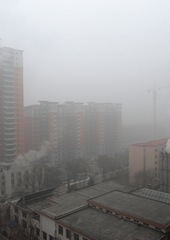Finger-Wagging Over Asian Health Risks
Premiums for health risks could move Asia toward a better habitat, but a tenser trade environment.
May 25, 2014

Can working in China make you sick? Japanese electronics giant Panasonic certainly thinks so. It’s prepared to pay its expatriates for sacrificing their health to do business in the country.
But while the possibility of other major Japanese manufacturers following in Panasonic’s footsteps may help boost the morale of corporate executives venturing across the Sea of Japan, Tokyo’s relations with Beijing may be sacrificed in the long run.
Worries about China’s air quality are nothing new. Since the 2008 Beijing Olympics, the world has been conscious about the heavy price the Chinese have paid in order to fuel the country’s dizzying rate of economic expansion.
Stories of Beijing trying to suppress independent reporting of air quality by foreign organizations including the U.S. embassy in the Chinese capital underscore how seriously the Chinese and other governments consider pollution. Even < a href=“http://sinosphere.blogs.nytimes.com/2013/10/21/air-pollution-hits-harbin-in-northeast-china-closing-schools-and-roads/?_php=true&_type=blogs&_r=0”>visibility in China has been affected by the poor air quality.
Invasion from the air
What’s more, with pollution creep knowing no borders, the spillover effects too have been felt in neighboring Japan and Korea as well as in Russia. These nations have been treated to everything from smog to sandstorms and chemical spills, all of which have had a direct impact on the quality of daily life of people outside of China.
Yet, until now no private company has actually stated outright that China’s pollution levels contribute to it being deemed a hardship post for executives, and that expats need to be financially compensated for sacrificing their health as a price for doing business in the world’s second-largest economy.
In effect, it is the premium for investing in what still remains one of the most robust global markets that has a slew of risks as well as opportunities.
Obviously, labeling a country as polluted and unhealthy is hardly a diplomatic move and could actually backfire on Japan, especially given Japan’s own ongoing struggle to deal with the aftermath of its worst nuclear accident to date.
Japan’s potential own goal
Over three years have passed since the Fukushima nuclear reactors were damaged following a massive earthquake and tsunami, but areas near the site are still under mandatory evacuation.
Worries abound, too, about radioactive water spilling out, not to mention concerns about the Japanese government not being forthright about the exact state of the reactors and radiation levels in the region. How then is Japan, a very advanced economy, to blame China for its own environmental failures?
Not surprisingly, neighboring China and South Korea have been particularly vocal about their concerns about potential radiation spillover from Japan. Indeed, Seoul has banned imports of all fish products from eight Japanese prefectures amid fears of radiation contamination, while China has expanded similar import restrictions to 12 prefectures.
Pollution and outrage across Asia
Indeed, a total of 44 countries including the United States continue to impose partial food import restrictions from foods, particularly fish, from Japan amid continued fears about radiation contamination.
So perhaps it will only be a matter of time before Chinese and Korean officials and executives begin to slap on their own so-called Japan premium and offer hardship compensation to its high-flying executives for being exposed to foodstuff that citizens back home are protected from.
Such a move would certainly play well to a sizeable domestic audience in both Korea and China, It would also rally patriotic fervor there, at the cost of antagonizing Tokyo still further.
Yet, should more Japanese companies join the Panasonic bandwagon and single out China’s air pollution as a major health hazard that warrants supplemental compensation for its top brass, the urge for Beijing to counteract will become harder to resist.
Either way, these mutual recriminations will hardly contribute to a thawing in the already tense relations between Japan and China.
Cooperation instead of blame games
Moreover, despite the real fears about the safety of Fukushima, Japan has not stopped from pushing for more food exports. In fact, with the United Nations’ officially blessing the country’s gourmet cooking as a cultural heritage last year, Tokyo has actually stepped up its efforts to promote Japanese food.
By securing the so-called “washoku” tradition of Japanese cuisine worthy of UNESCO’s support, Tokyo is certainly not shying away from promoting itself as a destination for foodies and exporting its restaurant heritage overseas.
The fact that the European Union relaxed its restriction on Japanese food imports in April, and no longer require measuring radiation levels on products from Tokyo, is certainly a bright spot for Japan’s food producers. Nevertheless, the EU will continue to demand certificates ensuring safety for foods produced in Fukushima.
Just as air pollution is a serious threat to the health of those living not only in China, but across Asia, Japan’s radiation contamination is not simply bound within Japan’s borders.
Both issues are equally serious issues and will greatly benefit from cross-border cooperation. If they devolve into accusatory finger wagging between neighbors, we will have a political spectacle, but no practical resolution for all the peoples concerned.
The way forward will be to play down the nationalist card of embarrassing the other country as much as possible, and concentrate on the fact that access to clean air, water and food are the bedrock to regional stability in the future.
Takeaways
After Fukushima, who is Japan, a very advanced economy, to blame China for its own environmental failures?
Until now, no private company has stated outright that China’s pollution makes working there hard for executives.
Labeling a country as polluted and unhealthy is hardly a diplomatic move -- and could backfire on Japan.
Will other Asian nations offer health premiums to executives working in Japan for being exposed to nuclear risks?
Asian nations must play down the nationalist card by embarrassing the other country as much as possible.
Access to clean air, water and food are the bedrock to regional stability in Asia.
Read previous

Asia Searches for Its Path to the Future
May 24, 2014
